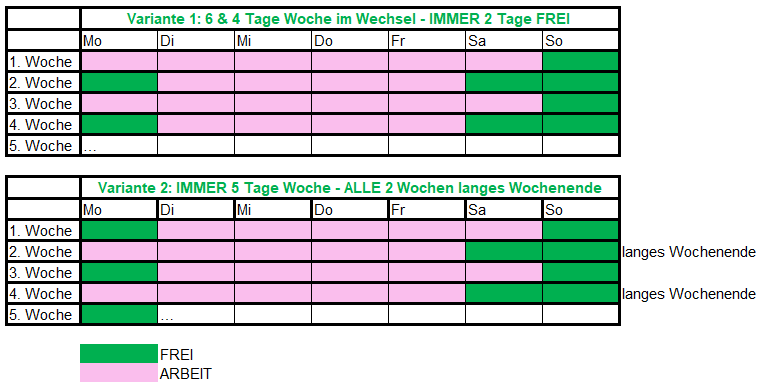Den Begriff „Arbeitswoche“ verbinden die meisten von euch wahrscheinlich mit dem Zeitraum von Montag bis Freitag (= 5-Tage-Woche). Das Wochenende – Samstag und Sonntag – hat man dann frei.
Was passiert aber, wenn man alle zwei Wochen am Samstag arbeitet? Wie verschieben sich dann die freien Tage?
Variante 1
- 1. Woche: Montag bis Samstag arbeiten = 6-Tage-Woche – Sonntag & Montag frei
- 2. Woche: Dienstag bis Freitag arbeiten = 4-Tage-Woche – Samstag & Sonntag frei
- -> 6-Tage-Woche & 4-Tage-Woche im Wechsel
- -> IMMER 2 Tage am Stück frei
Variante 2
- 1.Woche: Montag frei – Dienstag bis Samstag arbeiten – Sonntag frei
- 2. Woche: Montag bis Freitag arbeiten – Samstag, Sonntag & Montag der 3. Woche frei = langes Wochenende
- -> IMMER 5 Tage Woche
- > kurzes & langes Wochenende im Wechsel
Daran sieht man, dass eine 5-Tage-Woche nicht zwingenderweise von Montag bis Freitag sein muss. Die Arbeitstage können auch ganz anders aufgeteilt werden.
Ich arbeite in meinem Ausbildungsbetrieb: Fleischerei Scheller alle zwei Wochen am Samstag. Dafür habe ich nach Absprache mit meinem Chef: Carsten Scheller, Variante 2 gewählt. Das hat den Vorteil, dass ich an meinen langen Wochenenden in die Heimat fahren kann. Hiermit ein Herzliches Dankeschön an meinen Chef, dass er so flexibel in Bezug auf die Arbeitszeiten-Einteilung ist.
Bei eurem letzten Restaurantbesuch sind euch doch bestimmt auch die Stellenanzeigen aufgefallen, oder? Habt ihr euch schonmal Gedanken darüber gemacht, warum fast jedes Restaurant Personal sucht? Im Restaurant ist Hochbetrieb am Wochenende. Also genau dann, wenn Freunde und Familie frei haben. Welche Möglichkeiten gibt es, um das Problem zu lösen und genug Personal zu finden?
Arbeitszeiten sind ein großes Thema! Arbeitszeiten und Gehalt sind die wichtigsten Entscheidungskriterien, für oder gegen die Arbeitsstelle. Flexible und an die Bedürfnisse der einzelnen Mitarbeiter angepasste Arbeitszeiten tragen erheblich zur Mitarbeiterzufriedenheit bei.
Working hours model
I guess lots of you connect the term `workweek´ with the period from Monday to Friday (= 5-day-week). At weekends – Saturday and Sunday – you are off work then.
But what happens if you are working on Saturdays every two weeks? To when get the days off postponed?
Version 1
- 1st week: work from Monday to Saturday = 6-day-week – days off on Sunday & Monday
- 2nd week: work from Tuesday to Friday = 4-day-week – days off on Saturday and Sunday
- -> 6-day-week & 4-day-week in constant change
- -> ALWAYS two days in a row off
Version 2
- 1st week: day off on Monday – work from Tuesday to Saturday – day off on Sunday
- 2nd week: work from Monday to Friday – days off on Saturday, Sunday & Monday of the third week
- -> ALWAYS 5-day-week
- -> short & long weekend in constant change
This shows, a 5-day-workweek doesn’t have to be from Monday to Friday. The workdays can be spread different as well.
I am working at the butcher shop Scheller on Saturdays every two weeks. Therefore, I chose Version two in agreement with my boss: Carsten Scheller. The advantage is it makes it possible for me to spent the long weekends at home. Thank you very much to my boss for being flexible in scheduling working hours.
Did you see the job advertisement at the restaurant the last time you were eating out? Did you ever think about, why every restaurant searches for staff? Restaurants need staff which is available on weekends. Friends and family are usually not working on weekends. Which possibilities are there to solve this problem and get enough staff?
Working hours are a major topic! Working hours and wages are the most important decision criteria, for or against a job. Flexible working hours, which are adjusted to the requirements of the employees have a significant impact on employee satisfaction.

